Even if you have nothing to hide, searching the web with Google can sometimes feel unnerving.
Maybe you’ve got a medical question or financial concern that you’d rather keep to yourself, or you want to research a product that won’t later become fodder for targeted ads. In all those cases, it’s nice to search the web without having a tech giant logging your every move.
That’s why I’m a big proponent of spending some quality time with private alternatives, ones that don’t keep a record of your search history. Set a search engine like DuckDuckGo as your default, and you end up missing Google less than you’d anticipated. And if not, you can always go crawling back.
Below are some of the best ones to check out. While they each have their pros and cons, they all promise not to keep a personal record of your search history.
DuckDuckGo
DuckDuckGo promises to never create a personal history of your searches, and it doesn’t collect information about your computer that might be used to identify you. It’s also the most polished private search engine available, with dedicated results carousels for videos, recipes, and shopping. It also offers an array of extra privacy options, such as the ability to hide searches from the URL and address bar—and, by extension, from your browser’s history.

But like most private search engines, the results can feel less comprehensive than with Google, especially as your searches get more detailed. It’s also missing one table-stakes feature: It doesn’t display article publication dates in its main search results.
Data collected: DuckDuckGo doesn’t store cookies by default, but will do so to remember your search settings if you change them. It anonymously aggregates users’ searches to identify issues, such as misspellings. For local search results, DuckDuckGo collects an approximate location using your IP address—or a precise location on mobile devices, if you opt in—but doesn’t store that data after using it to serve information.
Search sources: Result links come primarily from Microsoft’s Bing search engine, but DuckDuckGo uses hundreds of other sources for its category pages and instant answers.
Extra privacy features: DuckDuckGo offers mobile browsers and desktop extensions with tracking controls, along with additional settings to reduce data collection even further.
How it makes money: DuckDuckGo includes ads in its search results and adds affiliate codes to some links (such as Amazon and eBay) to earn a sales commission on things you buy.
Brave Search
Still in beta after launching in June, Brave Search is already a formidable DuckDuckGo alternative, in that it also keeps no record of your search history. Its results pages are slick, and it’s realistic about its blind spots; each results page includes a link to the same query on Google in case you’re not satisfied with what Brave turns up. You can also manually set a zip code to get local results for that area without sharing your IP address.
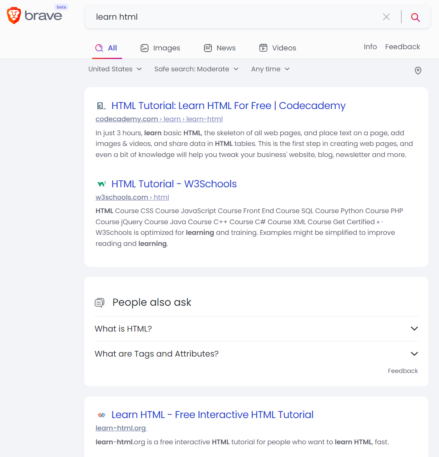
On the downside, load times are a little on the slow side, and its search categories are limited to news, images, and videos.
Data collected: Brave collects anonymous metrics on things like search frequency, query length, and whether the search leads to a link click, and it temporarily uses your IP address to deliver local search results. Both these options can be disabled.
Search sources: Brave is building its own index of the web, but mixes in results from Google and Bing if its own index falls short. A “results independence” percentage, accessible through Brave’s settings menu, shows how often this happens.
How it makes money: Brave plans to offer a free ad-supported version and a paid ad-free version of its search engine in the future.
Startpage
Startpage gets its search results from Google via a unique arrangement with the search giant, and its straightforward list of blue links feels a lot like what Google used to be—for better or worse. While it has separate pages for images, videos, and news, it lacks the kinds of detailed answer widgets, video carousels, and page grouping that you find in other modern search engines.
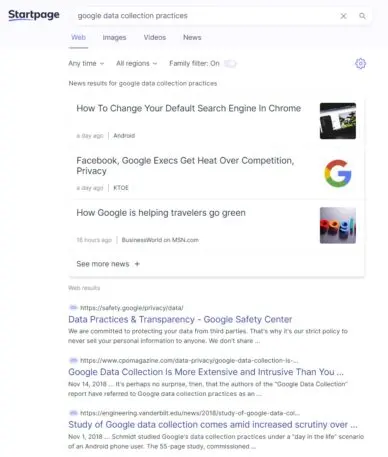
Still, it’s an interesting way to get Google-like results in a private way, and it takes further steps to minimize data collection than some of its rivals. For instance, it doesn’t include your query in its URLs or page titles, so they don’t show up in your browser history, and it doesn’t log IP addresses unless it thinks you’re a robot searching at extremely high volumes. You can also click the “Anonymous View” button on any search result to load the page through a proxy server, preventing it from identifying you.
Data collected: Startpage keeps aggregate statistics that are not tied to individual users, such as the operating systems, browsers, and languages that visitors are using. It also uses cookies if you choose to save changes to the default search settings (though you can alternatively access these changes with a unique link).
Search result sources: These mostly come from Google, though its news section is powered by Bing.
How it makes money: Startpage shows advertisements based on your current search query. (A minor controversy broke out last year when an advertising company called System1 became a major investor; Startpage says its original owners make all privacy-related decisions, and that System1’s investment was borne out a desire to diversify away from privacy-invasive business models.)
Neeva
Instead of merely serving as a search engine, Neeva positions itself as a kind of information concierge. Beyond traditional search results, it can serve up personal information from apps, such as Google Drive and Dropbox, and its “Spaces” feature lets you save links to retrieve later. That makes its knowledge base feel broader than Google’s in some ways, even if its core search results aren’t on par.
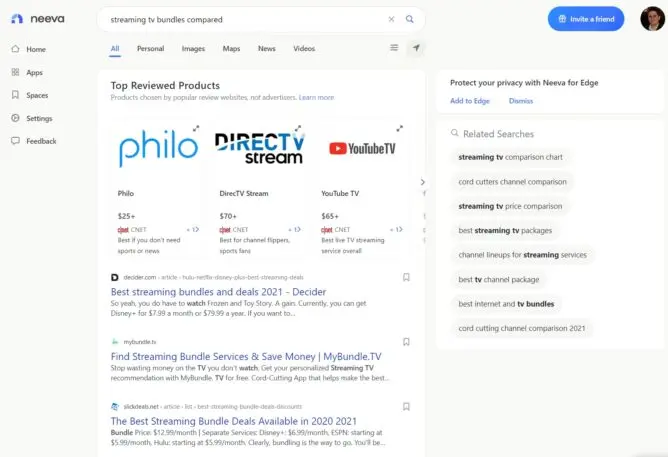
Neeva is also the only paid search engine on this list, with a subscription price of $5 per month after a three-month trial. In exchange, the company promises to be completely ad-free. Still, it’s a bit less private than some other private search engines, as it relies on user data to personalize its results.
Data collected: Neeva does require a login to use, and by default it keeps a record of your search history, which can be disclosed to third parties in response to a subpoena or court order. (This “Memory Mode” can be disabled in Neeva’s settings.) It also collects information about your operating system and browser, and it uses your IP address for local results.
Search result sources: Neeva has its own index, but also mixes in search results from other sources such as Bing, Google Maps, Yelp, and Weather.com. That’s in addition to any personal data sources you connect to the service.
How it makes money: Neeva has a subscription business model, making money directly from users by charging $5 per month.
Mojeek
Mojeek, which has been around since 2004, does not keep a personal record of users’ search results, and it only logs users’ locations at the country level. That limits any concerns over location-based data collection, albeit at the expense of local information.
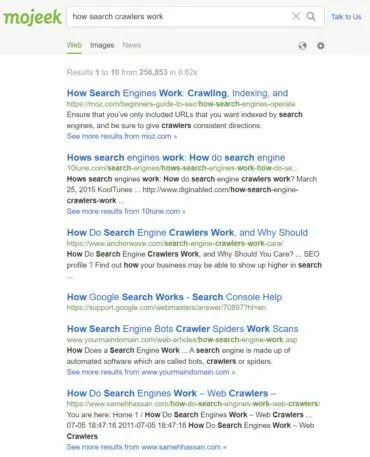
While it’s not the slickest search engine—it lacks category sections for maps, shopping, and videos—it earns bonus points for building its own web index instead of leaning on Bing or Google.
Data collected: Mojeek collects anonymous, aggregate search information to improve its results, along with other aggregate information, such as time of visit and referral data.
Search result sources: Mojeek relies entirely on its own index, which has crawled more than three billion pages as of April 2020.
How it makes money: Mojeek sells various services to businesses, such as site-specific search and an API for web results.
Presearch
A private search engine for cryptocurrency geeks, Presearch routes searches through “nodes” run by other users, who in turn query a variety of sources to deliver results. Users earn cryptocurrency tokens for each search, as do the community members who run each node. Effectively, the node providers assume the risk of having searches associated with their IP addresses, while users get to search privately.
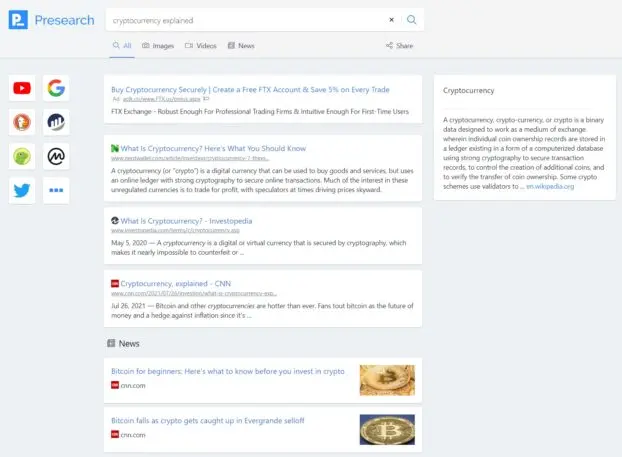
The results themselves can be hit or miss, but the token system provides a small incentive to stick with it, as does the promise of building a decentralized search network, as detailed in this TechCrunch profile.
Data collected: Since the token system requires an account, Presearch collects an email address and password. It also collects an IP address, information about your computer and web browser, and some basic details on how you use the search engine.
Search result sources: The company doesn’t specify, but it’s a mix of other search engines, databases, and APIs.
How it makes money: The goal is to build the value of Presearch’s cryptocurrency over time, and to have advertisers pay for contextual search ads in PRE tokens.
Private.sh
On the extreme end of the privacy spectrum, Private.sh promises to minimize data collection by encrypting search terms locally on your computer. It then sends the information through a proxy server to Gigablast, its search provider, which decrypts the query, reencrypts the search results, and sends them back to be decrypted by the browser again. That, in turn, prevents the search engine from knowing anything about you, including your IP address. (Gigablast itself is a privacy-focused search engine that promises not to share its query logs with anyone, and to delete them on “a regular basis.”)
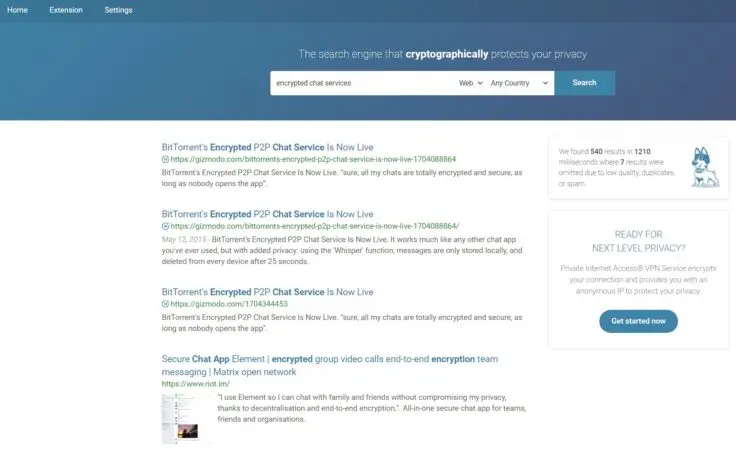
The results are bare bones, with no local results, no sorting options, and only “News” as an additional results category, but it seems like the surest way to search without a trace.
Data collected: None.
Search result sources: Gigablast, the underlying search engine, operates its own web crawler.
How it makes money: Private.sh is run by the VPN service Private Internet Access, and you’ll see an ad for that service on every search results page. (Private Internet Access itself has recently come under scrutiny after being acquired by a firm accused of creating malware and adware in the past. That company, Kape, is apparently now trying to clean up its reputation as it buys up various VPN services.)
One last private search tip
If you do go running back to Google in the end, at least consider turning off ad personalization via this page, turning off personalized search results on this page, and managing your auto-delete settings on this page. Doing so won’t prevent the company from collecting data about your searches, but it can help prevent that data from coming back up when you least expect it.
This story has been updated to further clarify Startpage’s data collection policies.
Check out Jared’s Advisorator newsletter for more tech advice and tips.
Recognize your brand’s excellence by applying to this year’s Brands That Matter Awards before the early-rate deadline, May 3.
